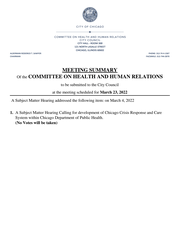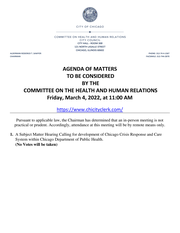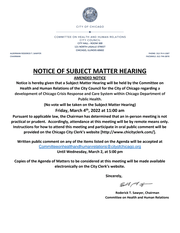Committee on Health and Human Relations
Chicago City CouncilRemote
This is a remote assignment. To access, go to https://livestream.com/accounts/28669066.
At this link you’ll see several video “events” with various statuses and titles. Click on the event that is “Live” or “On Air”––it will likely be titled “COC-Council Chambers” or COC-Council/Committee Meeting (2)”.
If none of the streams appear to be live you may be early or the meeting may be starting late. Wait a few moments and try refreshing your Internet tab.
Past committee meeting videos may be found at https://vimeo.com/showcase/chicago; past City Council meeting videos are at https://vimeo.com/showcase/citycouncil.
Check the source website for additional information
Reporting
Edited and summarized by the Chicago - IL Documenters Team
Crisis Assistance Response and Engagement (CARE) pilot, alternative co-responder, Mental health emergency
Crisis Assistance Response and Engagement (CARE) pilot, alternative co-responder, Mental health emergency

10:57 AM Mar 4, 2022 CST




chicagotribune.com/news/breaking/…











thresholds.org



























-988 is the newest hotline for suicide prevention














































Agency Information
Chicago City Council
The Chicago City Council is the legislative branch of the government of the City of Chicago and consists of the Mayor and Aldermen elected from each of the City’s fifty wards. Source
If you attend a meeting in person, be prepared to go through a security checkpoint and show photo ID.
Meetings are also livestreamed at https://www.chicityclerk.com/.
At this link, scroll down to “Meeting Notices.” Look for “Watch now” and click on the link with the meeting title to go to a livestream page. If you don’t see a link for the meeting, you may be early or the meeting may be starting late. Wait a few moments and try refreshing your Internet tab.
Recordings of past City Council meetings may be found here: https://vimeo.com/user100351763/videos/sort:date.
See also: “What to Expect at a Meeting of Chicago’s City Council” via the Better Government Association.
Documents
More from this agency
Committee on Pedestrian and Traffic Safety
Chicago City Council
Monday, July 29, 2024
10:00 a.m. CDT
Committee on Economic, Capital and Technology Development
Chicago City Council
Wednesday, Sept. 4, 2024
10:00 a.m. CDT
Committee on Transportation and Public Way
Chicago City Council
Wednesday, Sept. 4, 2024
10:30 a.m. CDT
Committee on Economic, Capital and Technology Development
Chicago City Council
Wednesday, Sept. 11, 2024
10:00 a.m. CDT



















